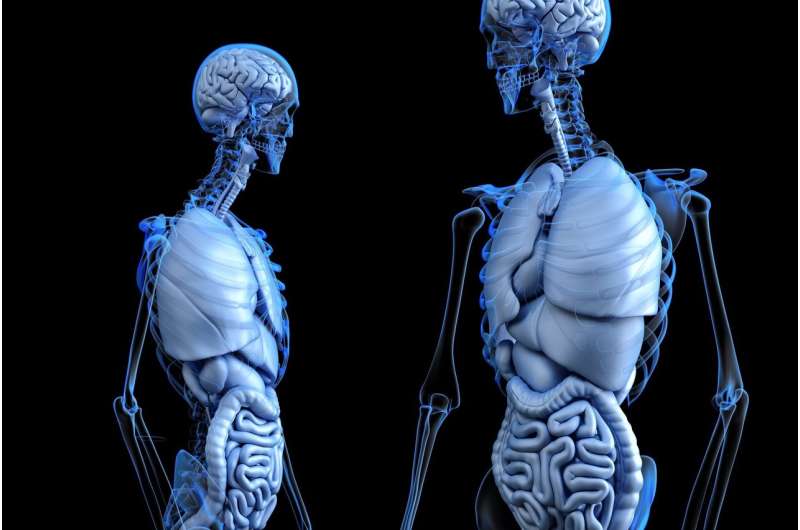This article has been reviewed according to Science X's editorial process and policies. Editors have highlighted the following attributes while ensuring the content's credibility:
fact-checked
proofread
Research reveals possible link between gastrointestinal syndromes and risk of brain aneurysm

There is a potential connection between a diagnosis of certain gastrointestinal (GI) syndromes and the formation and rupture of intracranial (brain) aneurysms, according to research presented today at the Society of NeuroInterventional Surgery's (SNIS) 21st Annual Meeting.
An intracranial aneurysm (IA) occurs when a blood vessel in the brain bulges, putting pressure on the vessel wall. IAs that rupture cause brain bleeding and lead to a hemorrhagic stroke, a life-threatening emergency requiring immediate medical attention from a neurointerventionalist. Researchers have questioned whether GI syndromes may be connected to the formation and rupture of IAs.
In their study, "The Gut-Brain Axis: A Nationwide Database Analysis of Gastrointestinal Syndromes Preceding a Diagnosis of Intracranial Aneurysms," researchers from the University of Pennsylvania found that certain digestive symptoms and diagnoses may precede the formation and rupture of IAs.
The team analyzed data from 72,545 individuals with ruptured IAs, 46,748 individuals with unruptured IAs and matched controls looking for patients who had been diagnosed with GI disorders like gastroesophageal reflux disease, irritable bowel syndrome (IBS) and diarrhea before their IA diagnosis. Then, they validated their findings in a cohort study with a five-year timeframe. Researchers found that GI syndromes and appendectomy were associated with both ruptured and unruptured IA cases.
Specifically, patients with IA who had been previously diagnosed with difficulty swallowing (dysphagia), diarrhea and constipation were more likely to experience both IA formation and rupture, leading to hemorrhagic stroke. Separately, they found that patients with IA who had been diagnosed with reflux disease, chronic stomach pain and bloating (known as functional dyspepsia), and IBS without diarrhea were more likely to only experience IA formation without rupture.
"There is evidence from animal studies suggesting a relationship between the gut microbiome and various inflammatory diseases, including the development and rupture of IAs. Therefore, validating this new potential connection in humans has been enlightening," said Georgios Sioutas, MD, the primary author of the study and a postdoctoral research fellow in neurosurgery at the University of Pennsylvania.
"Now that we have found more evidence for a link between IAs and GI disorders, we are eager to explore them further, hoping that early detection of GI syndromes might help identify patients at risk of IAs," said Jan-Karl Burkhardt, MD, the lead author of the study, associate professor of neurosurgery, and division head of cerebrovascular surgery at the Hospital of the University of Pennsylvania.
Dr. Sioutas emphasized the need for further studies to elucidate these associations and explore the intricate interplay among GI syndromes, the gut microbiome and IA pathogenesis.



















